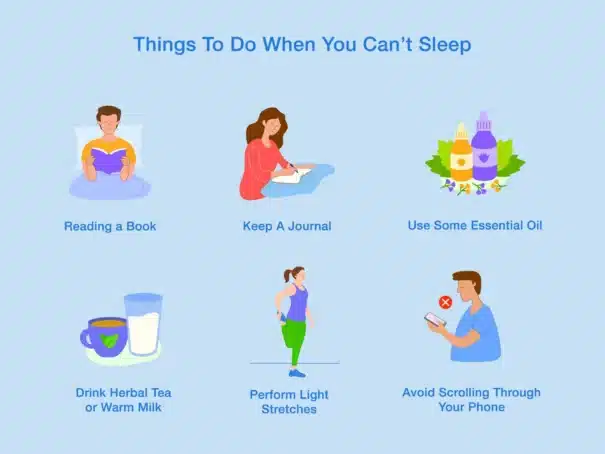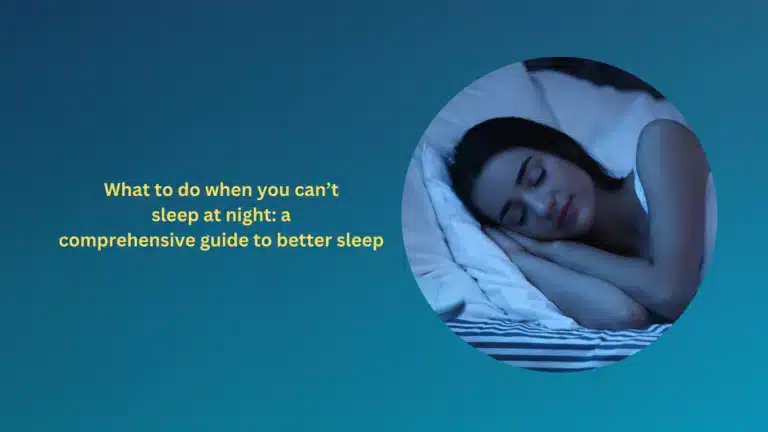Few things are as frustrating as lying in bed, staring at the ceiling, unable to fall asleep. Sleeplessness can leave you tossing and turning, thinking about the day behind you or the one ahead. Whether it’s an occasional problem or chronic insomnia, the inability to fall asleep can significantly affect your mental, emotional, and physical well-being.
In this guide, we’ll explore practical solutions, expert tips, and strategies to help you fall asleep and stay asleep. By understanding the science of sleep, its triggers, and effective remedies, you’ll be equipped to turn restless nights into rejuvenating slumber.
Understanding Why You Can’t Sleep
Sleep is a dynamic process involving multiple stages and cycles. When sleep eludes you, it’s often due to disruptions in your natural sleep-wake cycle, also known as your circadian rhythm. Here are some common causes of sleeplessness:
1. Stress and Anxiety
When your mind is racing, sleep becomes a challenge. Stress and anxiety activate your fight-or-flight response, keeping your brain alert when it should be winding down.
2. Poor Sleep Hygiene
Irregular sleep schedules, too much screen time before bed, or consuming caffeine or heavy meals late at night can interfere with your body’s ability to relax.
3. Medical Conditions
Sleep apnea, restless legs syndrome, and chronic pain are just a few conditions that can disrupt sleep. Identifying and managing these underlying issues is crucial.
4. Lifestyle Choices
A sedentary lifestyle, lack of exposure to natural light, or over-reliance on alcohol or sleeping pills can throw your sleep cycle off balance.
5. Environmental Factors
Noise, light, uncomfortable bedding, or an unsuitable room temperature can make falling asleep difficult.
Practical Tips to Help You Sleep

1. Create a Sleep-Friendly Environment
- Dark and Quiet: Use blackout curtains and earplugs to block out light and noise.
- Cool Temperature: Keep your room at an ideal temperature (around 65°F or 18°C).
- Comfortable Bedding: Invest in a supportive mattress and cozy pillows.
2. Establish a Consistent Sleep Schedule
- Go to bed and wake up at the same time every day, including weekends.
- Limit naps to 20–30 minutes and avoid napping late in the day.
3. Reduce Screen Time Before Bed
- Avoid screens (phones, tablets, TVs) at least an hour before bedtime.
- Use blue light filters or apps to reduce exposure to disruptive light wavelengths.
4. Be Mindful of What You Consume
- Avoid caffeine and nicotine in the afternoon and evening.
- Skip heavy meals, alcohol, or sugary snacks before bed.
- Opt for sleep-promoting foods like almonds, cherries, or chamomile tea.
5. Relax Your Mind and Body
- Meditation or Deep Breathing: Slow, deliberate breaths can calm your nervous system.
- Progressive Muscle Relaxation: Gradually tense and relax each muscle group.
- Journaling: Write down your worries or to-do list to clear your mind.
6. Exercise Regularly
- Engage in moderate exercise, such as walking or yoga, during the day.
- Avoid vigorous workouts within three hours of bedtime, as they can be too stimulating.
Expert Techniques to Fall Asleep
1. The 4-7-8 Breathing Method
This technique, developed by Dr. Andrew Weil, can help calm your mind:
- Inhale through your nose for 4 seconds.
- Hold your breath for 7 seconds.
- Exhale through your mouth for 8 seconds.
2. The Military Method
Used by soldiers to fall asleep quickly:
- Relax your face, including your tongue, jaw, and forehead.
- Drop your shoulders and let your hands fall naturally.
- Exhale and relax your chest.
- Imagine a peaceful scene or repeat a calming phrase like “don’t think.”
3. Visualization
Picture yourself in a serene environment, such as a beach or forest. Focus on the sensory details—soft waves, gentle breezes, or birds chirping.
4. Play a Mind Game
Distract your mind by mentally listing items in a category, like animals or fruits, alphabetically.
Key Strategies for Better Sleep
| Problem | Solution | Example |
|---|---|---|
| Stress/Anxiety | Deep breathing, journaling | Write down worries before bed |
| Screen Time | Reduce blue light exposure | Avoid screens 1 hour before sleep |
| Irregular Schedule | Establish a routine | Sleep/wake up at the same time daily |
| Uncomfortable Bed | Invest in quality bedding | Use a supportive mattress and soft pillows |
| Noisy Environment | Block noise | Use earplugs or a white noise machine |
| Late Night Caffeine | Avoid stimulants after lunch | Swap coffee for herbal tea in the evening |
FAQs
1. Why Can’t I Sleep Even When I’m Tired?
This can result from stress, an irregular sleep schedule, or medical conditions like insomnia. Try relaxation techniques and ensure your sleep environment is conducive to rest.
2. How Can I Fall Asleep in 5 Minutes?
Techniques like the 4-7-8 breathing method or the Military Method can help you relax quickly.
3. Should I Stay in Bed if I Can’t Sleep?
If you can’t fall asleep after 20 minutes, get up and do something relaxing, like reading or listening to calming music, until you feel sleepy.
4. How Much Sleep Do I Really Need?
Most adults need 7–9 hours of quality sleep per night.
5. When Should I See a Doctor for Sleep Problems?
Consult a doctor if sleeplessness persists for more than a month or if it’s accompanied by symptoms like snoring, gasping, or chronic fatigue.
The Role of Technology in Sleep Improvement
Advances in sleep technology offer innovative ways to monitor and improve sleep:
- Wearable Devices: Track sleep cycles and offer insights into your habits.
- Smart Mattresses: Adjust firmness and temperature to optimize comfort.
- Apps and White Noise Machines: Provide guided meditations or relaxing sounds.
Conclusion
Sleep is essential for physical and mental health. By addressing lifestyle factors, creating a calming bedtime routine, and employing relaxation techniques, you can overcome sleeplessness and wake up feeling refreshed.
If you’ve tried these strategies without success, consider seeking professional help to identify and treat underlying issues. With the right approach, better sleep isn’t just a dream, it’s a reality within your reach.


